10 things my wife learned from her first 100 miles e-biking to work

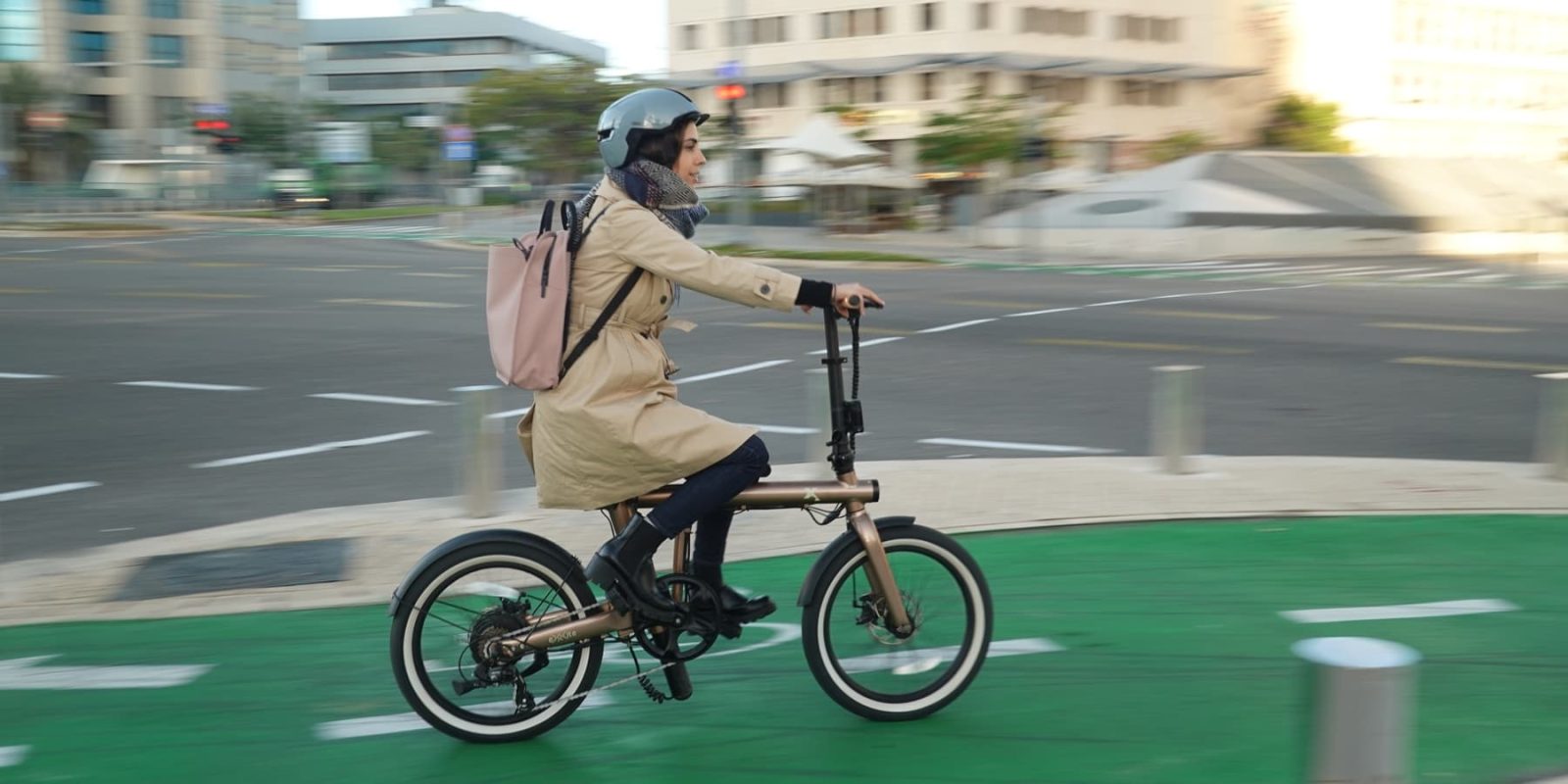
My wife has always been bike-curious. As the partner of a mobility journalist and prolific electric bike reviewer, it would be hard for her to avoid them if she tried. But most of her brief experiences with e-bikes comes from joining me on riding trips or the occasional rented e-bike on vacation. She’s the proverbial barefoot kid to my proverbial cobbler.
After beginning a new job this year though, she decided that she wanted to start riding an e-bike to work. Now over 100 miles (160 km) in, I pestered her with a bunch of questions to figure out what a relative newcomer to bike commuting has learned from the experience, both the good and the bad.
Or at least she was 100 miles in when I started writing this. As I’ve worked on this article in between more pressing news over the last few weeks, she keeps pushing that number higher. This morning, I checked her odometer, and she is now pushing 200 miles (around 320 km) – still a newcomer but a much wiser one than she was 200 miles ago.
The reason I was so interested in getting her perspective on switching to an e-bike commute is because as someone whose job it is to be surrounded by e-bikes, it can be tricky for me to maintain the perspective of a new rider.
But now I have the perfect opportunity, as my wife is an excellent case of someone who replaced a car with an e-bike for one of the most common uses: driving to work.
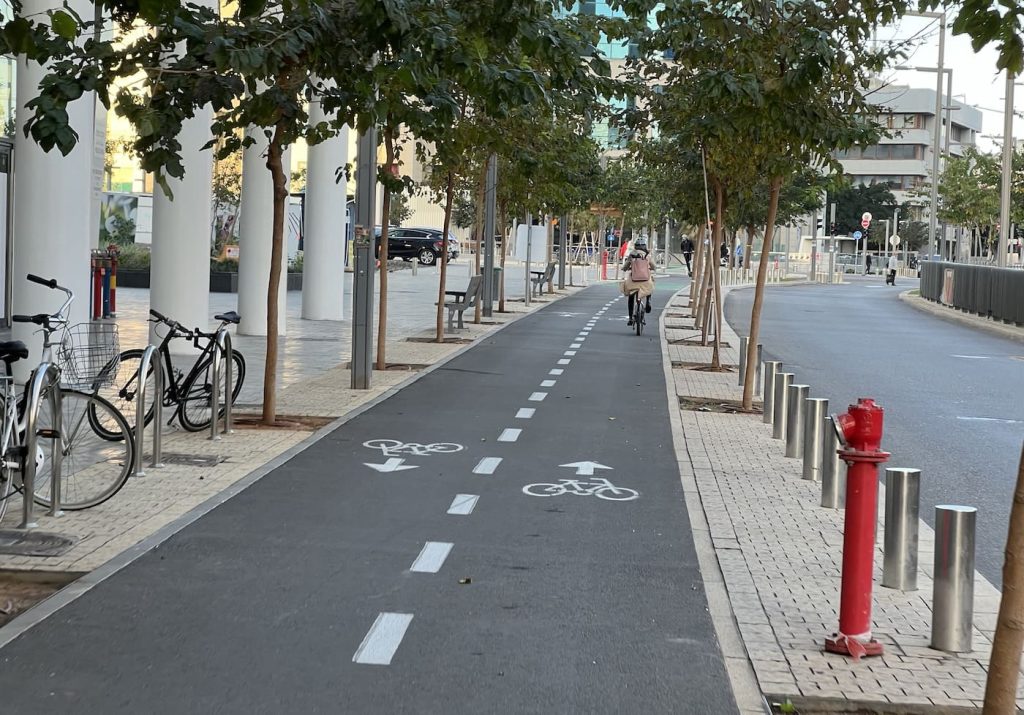
She just started a new position as an elementary school principal this year, and we live just over 2 miles (3.5 km) from her school, which is in the center of our city here in Tel Aviv. Like many big cities, the traffic is awful and finding parking is even worse.
Enter the solution: an e-bike. After searching around, she found one that she really liked (after seeing me test it in one of my Eurobike videos).
So we got her the bike of her dreams, a shiny gold-colored Exxite XS folding e-bike with 20” wheels. It looks great, and she loves that the seat goes low enough for her to rest her feet on the ground at stops – something that makes her feel much more stable and comfortable.

The first thing she told me when I asked how the experience had been so far was that she would never want to go back. We got the bike a few days after school started and so she began the year by taking the bus for the first few days.
The bus wasn’t ideal, but it worked. And when you don’t have a car, the bus looks a lot nicer than walking a few miles.
“It’s hard for me to consider going back to the bus now, that’s for sure,” she explained. “Now I can be on my own schedule, I don’t have to waste time waiting for the bus to show up or sit in traffic with everyone else on the bus just waiting to move.”
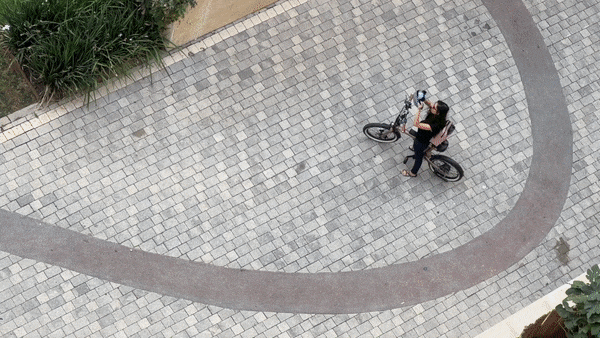
As a school principal, she leaves early in the morning. That means the bus trip there had been relatively short at 6-8 minutes (there’s not much traffic at 7:00 AM).
But on the way back in the afternoon, the same trip could easily take 45 minutes due to gridlock traffic.
Now, with her new e-bike, the trip takes just 10 minutes in each direction. It’s not quite as fast as the bus on a wide open road at the crack of dawn, but it’s much faster during traffic on the way home and saves her around half an hour total each day.
Because she can use bike lanes for around 90% of the route, traffic levels don’t impact her trip time on the way home in the afternoon.
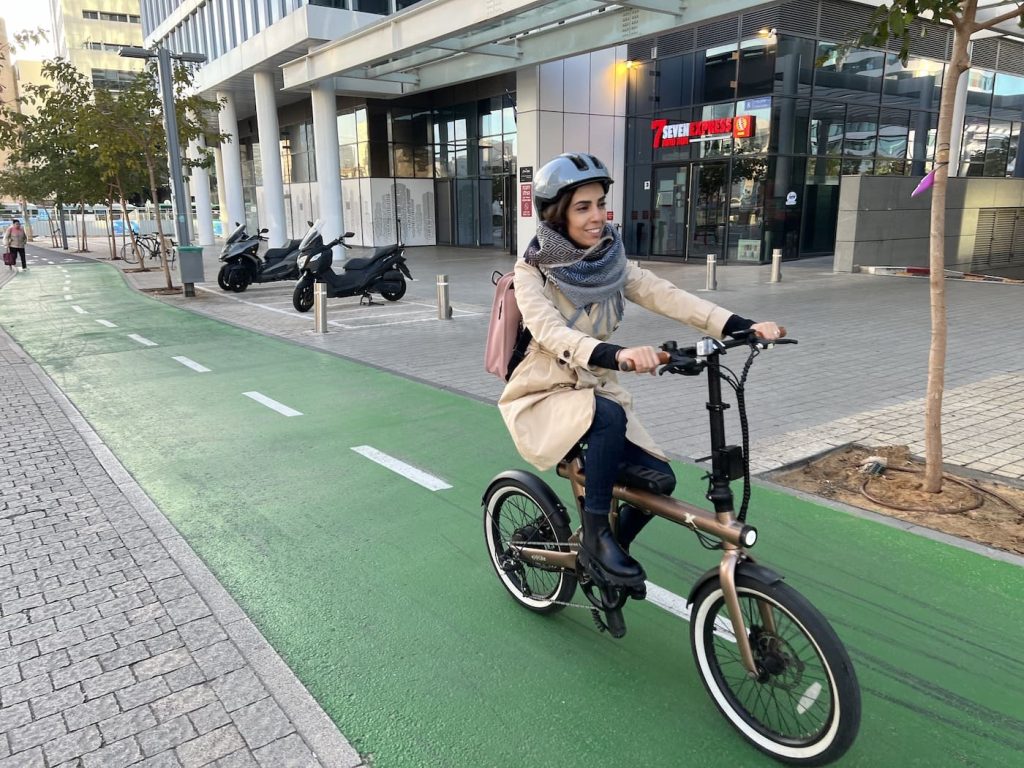
Originally fearing that riding a bike to work might be stressful, she actually found it to be the exact opposite.
“The more I ride, the more I get used to it. In the morning it’s actually a relaxing experience. Sometimes I just ride along singing to myself, enjoying the wind in my face. I also like that I’m being active and pedaling a little bit so I get some body movement in before I start the day. It puts me in a good mood each morning.”
While most of her route to work has a separate bike lane with much of it physically separated from cars, there is a section where she has to ride on the side of the road with cars. “That area is a bit stressful, and I have to be sure to pay extra attention,” she admits.
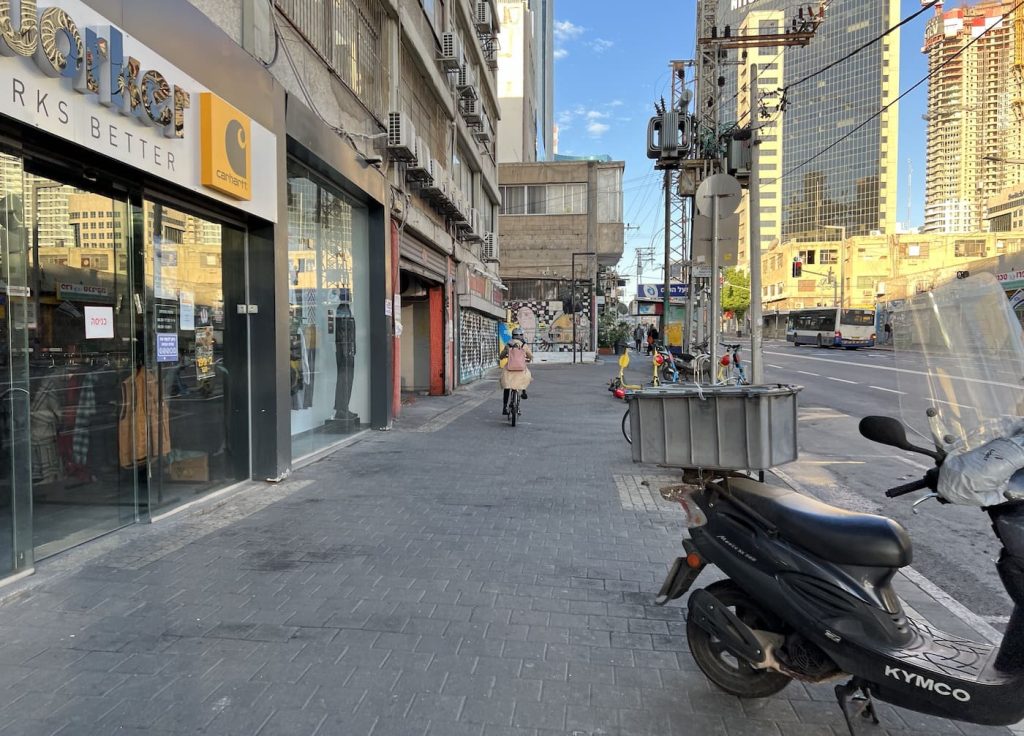
Unlike in North America, throttles on electric bikes are technically not legal here. Many e-bikes still have them and slip under the radar, but local regulations require pedal assist-only and maximum speeds of 25 km/h (15.5 mph).
Her bike is up to code, and so without a throttle, she relies on the varying levels of pedal assist power to impact her speed and effort level. “I like the way I can adjust the power. The other day, it was a chilly morning and I forgot a jacket, so I put the bike in the lowest power level and my extra effort warmed me up.”
Having joined me on many of my frequent e-bike trips in the US, she too has been spoiled by throttle-enabled electric bikes though and wants me to outfit her e-bike with a throttle “just in case” and for days when she’s tired after work and would like the option of cruising along without having to always pedal. People these days… no respect for the rule of law!
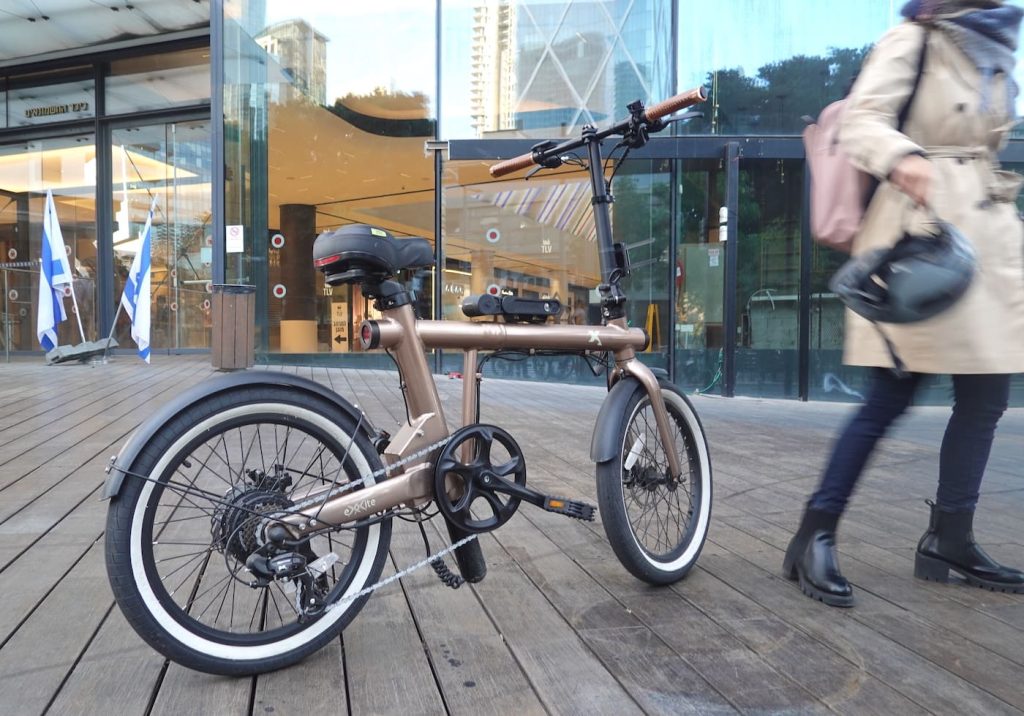
Not everything has been an entirely positive experience though, and my wife isn’t shy about telling me what she doesn’t like, either.
“Some days I can carry everything I need in my backpack,” she explained. On other days, when she has more to carry, she hangs a shopping bag from the handlebars, but she doesn’t like that method because it doesn’t feel safe to her.
“I need to add a basket to my bike,” she says to me with a look that implies “you need to add a basket to my bike.”
To be fair, it’s been on my list of things to do. It’s right up there with reviewing a half dozen bike AirTag location tracker holders, installing a ceiling-mounted hanging bike rack, and editing bike videos.
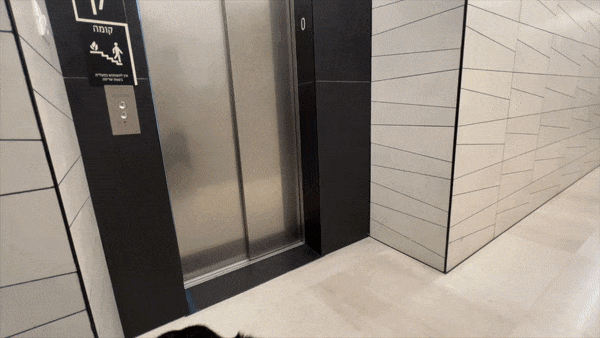
My strong and independent wife also explained that the bike is a bit heavy for her.
Technically speaking, at 42 lb (19 kg), it’s fairly average for the folding e-bike market, but she’s a little lady and I understand what she means.
When she’s got her hands full, I see her sometimes struggling to get in and out of the elevator and hold open the big glass doors to enter the lobby of our apartment building.
Sometimes you want to help her, but hey, ultimately you have to let them learn on their own.
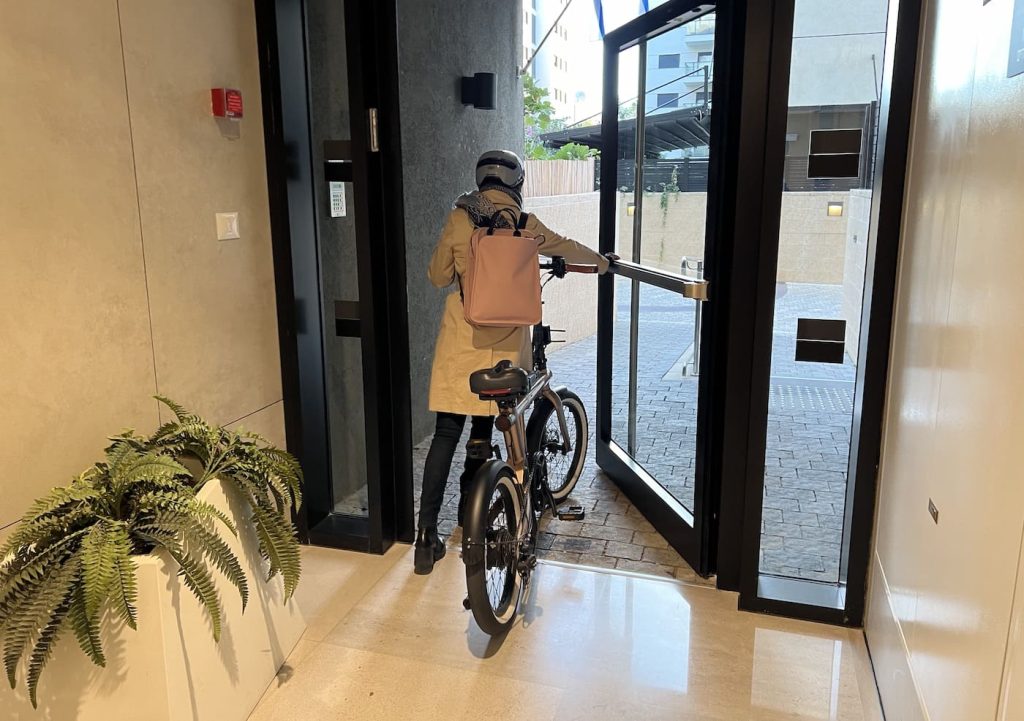
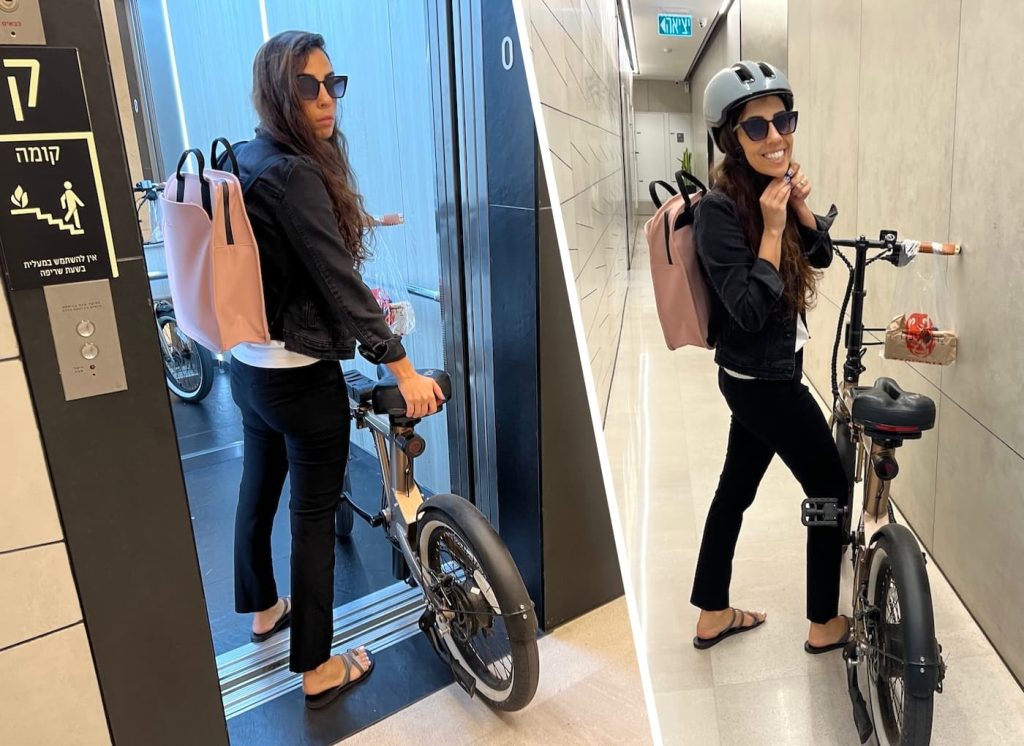
She’s also discovered the importance (and hassle) of locking a nice-looking electric bike to keep it from falling into thieves’ hands.
“I have to pay attention to where I lock it and always find something sturdy to lock to. Especially since it looks so good, I think it attracts attention.”
I set her up with two locks: a Foldylock Forever (which I think is one of the highest security bike locks in existence) as well as a super loud ABUS Alarmbox 2.0 motion-activated alarm.
From what I can tell, she doesn’t really take the time to set the alarm very often, but at least the folding lock would seriously slow down potential thieves.
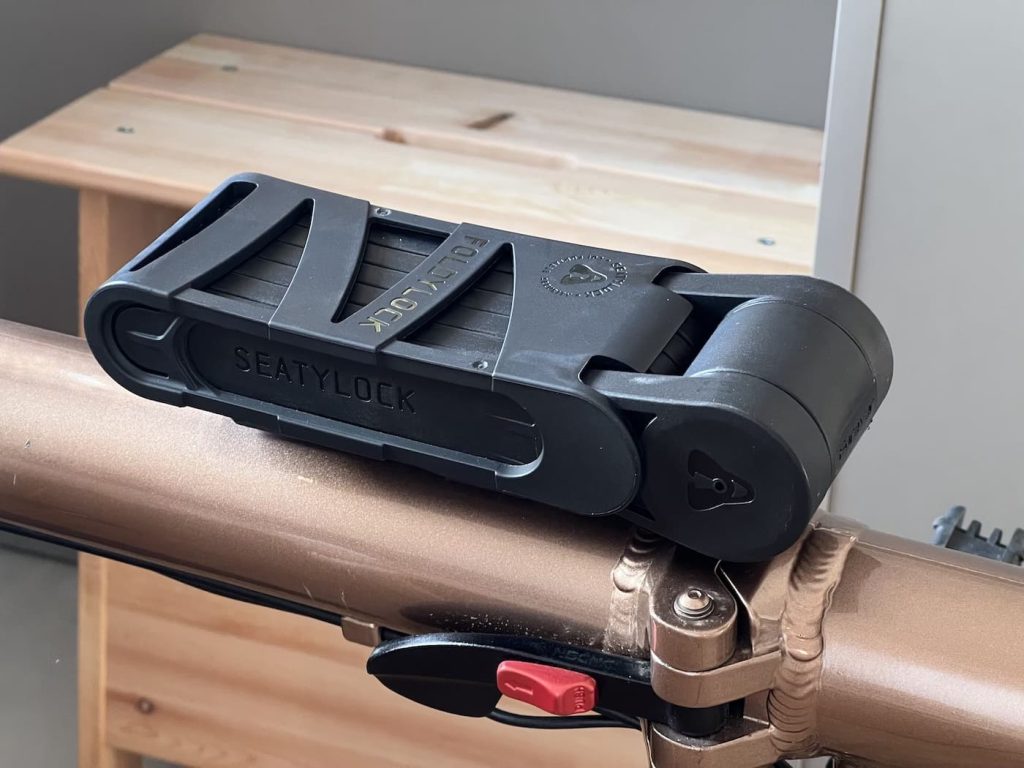
There’s also the apparent hassle of charging, which frankly surprised me that she considered it a downside, but this is a judgment-free zone.
“I have to remember to charge the battery fairly often. One time I forgot several days in a row and by the end of the week, the battery meter was down to the red on the way home. I didn’t run out, but I was worried it would and that got me stressed. I don’t want to have to pedal the bike without electricity because it feels pretty heavy that way.”
Then there’s the speed issue. “It only goes up to 25 km/h and that makes me feel uncomfortable in the sections that I have to ride on the road because I’m slow compared to the cars. Or even in the bike lane on long straight sections, I wish I could go faster and arrive even quicker.”
To be fair, many electric bikes around here have been modified to go faster than the 25 km/h Euro-limit, and so she is one of the few rule followers, often even getting passed in the bike lane.
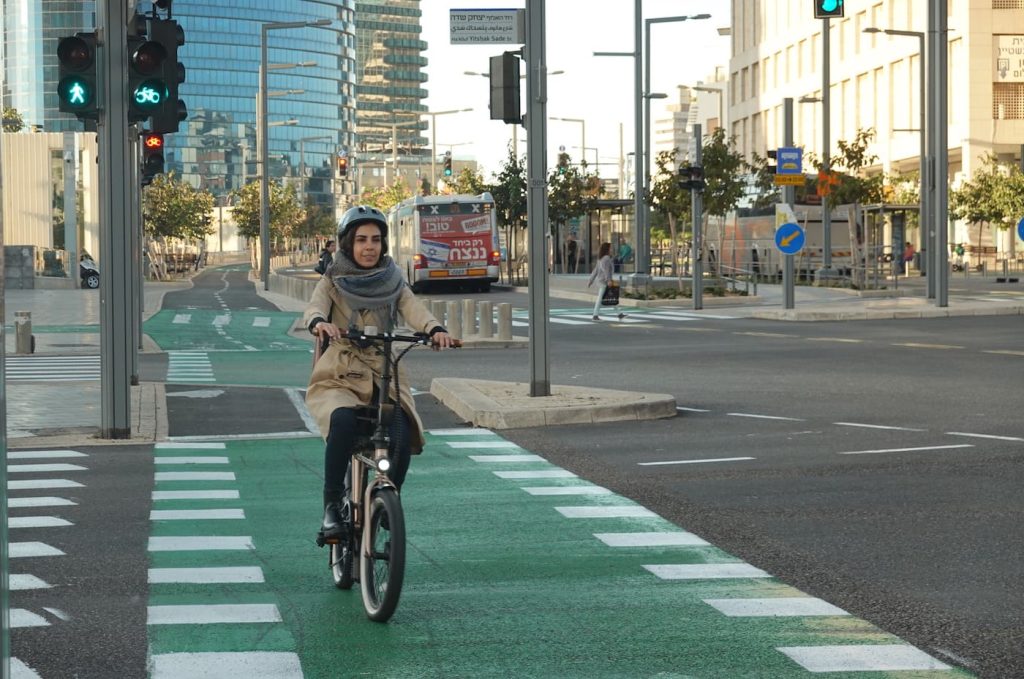
She’s not done with the complaints either, as I’ve apparently opened Pandora’s bike box here. “I also don’t like that I can’t really wear a skirt or dress without it sometimes flying up and everyone seeing my underwear. Or long flowing things like a shawl or my kimono that I’d be worried about getting caught in the wheels.”
Those aren’t problems I’ve ever personally considered, but that’s why it’s interesting to hear diverse perspectives.
The bike has fenders, but they have their limit. “Once I was riding and had to go through a puddle, and it splashed me. Now I’ve learned to pick my feet up when I go through a big puddle. Some of these things wouldn’t be that big of a complaint normally, but I’m going to work and I’m the school principal so I have to look professional.”
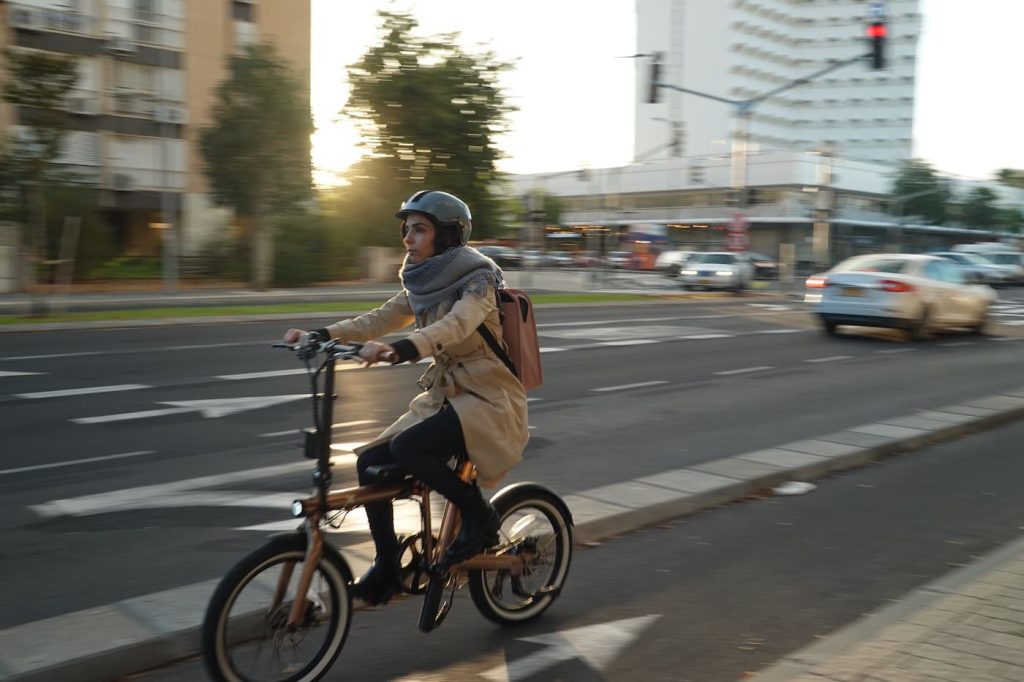
I assumed we were near the end, but I was wrong. As she continued, “I noticed I also really should wear sunglasses more often because a few times I forgot and a bug flew into my eyes.”
Then there’s the weather. “When it’s hot here, in the morning, it can still be nice to ride to work, but by the afternoon it can be quite hot on the trip home in the sun.”
Now that the temperature is cooling off though, she seems to enjoy the crisp weather during a ride.
Fortunately, that was the end of her list of disadvantages.
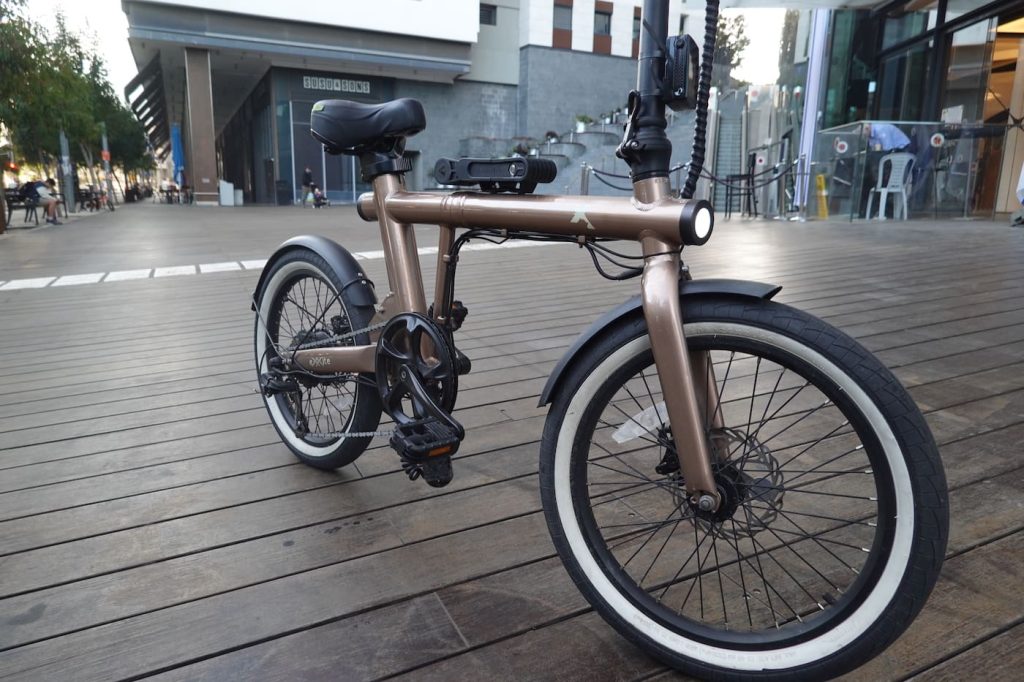
Just kidding, it continues.
“There are some red lights that are incredibly long to wait at, especially when there aren’t many cars on the road early in the morning. So I’ve started just checking that the road is empty and then going through.”
Technically, that puts her in the category of cyclists that car drivers like to think are responsible for the destruction of society and the slow tailspin our world is taking into the abyss, but I get her point.
In my opinion, it’s silly that she sits there at a red light, counting 100 seconds pass by, while the road is empty in both directions and most of the city is still asleep. If you drive a 4,000-pound piece of heavy machinery, waiting in the name of safety is a good idea so you don’t accidentally run someone over that you didn’t see. If you drive a 40-pound bike and have perfect 360-degree vision around you (and lack the physical ability to compress a pedestrian or cyclist into a pancake), then slipping through a red light on an empty road has an argument to be made.
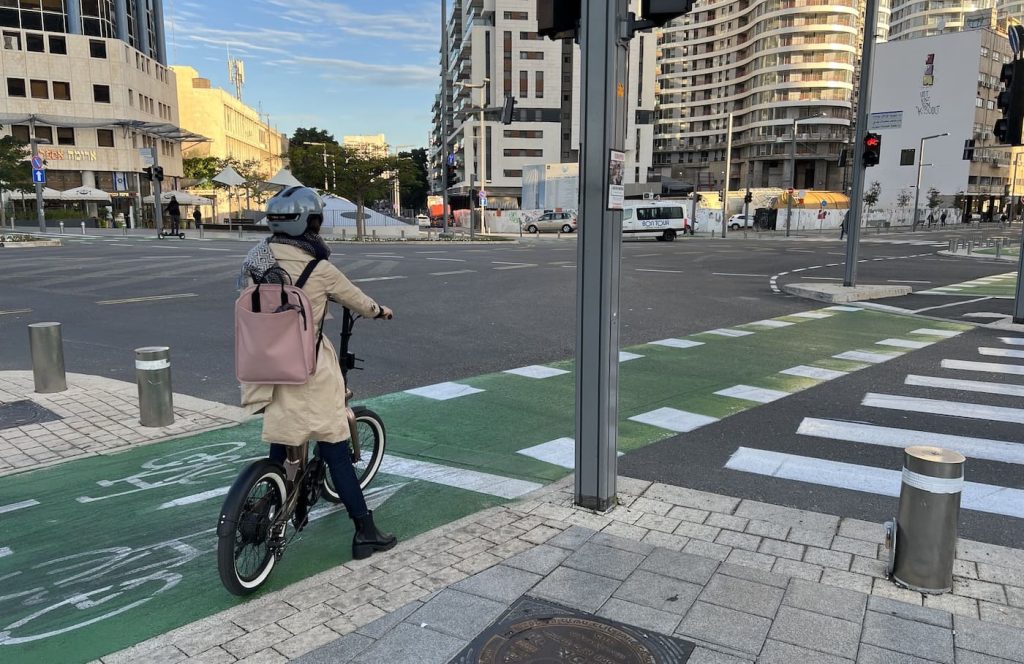
But for the most part, the experience has been overwhelmingly positive for her. And she enjoys setting a good example.
“Because we live in a city, most of my staff already come to school by bike, bus or by walking. But even more have switched to biking since I started, and I’ve also seen many of my teachers start wearing a helmet after they see me arriving to school wearing my helmet. I’m also looking into installing a bike room at my school so students and staff have a secure, guarded area to lock their bikes safely.”
We’re just starting to get into the rainy season, so we’ll see how well she holds up as the weather gets wetter. The few days it rained so far, she quickly discovered the plastic-bag-over-the-saddle trick. But she still has the bus as a backup for the days that it’s absolutely pouring outside.
Maybe we’ll be back here after the winter to report back on her first 500 miles (800 km). Until then, let’s hear what tips or discoveries you’ve learned from your own experience biking to work. Sound off in the comment section below!
FTC: We use income earning auto affiliate links. More.